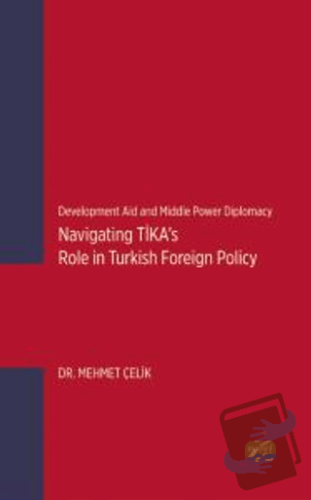Development Aid and Middle Power Diplomacy: Navigating TİKA’s Role in Turkish Foreign Policy

The influence of development aid on the foreign policy implementation of middle power countries has not been widely studied in the existing academic literature. In addition, states' perceived prestige, as an added indicator to measure a country's middle power status, has not been explored in the literature. As such, this study attempts to academically contribute to the existing literature by investigating how development aid affects the foreign policy of a middle power country in its relationship with the aid receiving country. Through both primary and secondary empirical data collected, the theoretical framework was studied by applying Türkiye's development and cooperation agency, TİKA's, influence on Turkish foreign policy on Somalia and Bosnia and Herzegovina between 2002 and 2018 as a case study. This case study was precisely selected as Türkiye has been a rising middle power state since the early 2000s and the use of development aid as foreign policy instrument has been considered one of the key successes in establishing a prestigious presence worldwide. Ultimately, this book attempts to answer the following theoretical questions: a) What is a middle power country? b) How does prestige contribute to the middle power status of a country? And, c) Do state development agencies positively or negatively affect middle power countries' foreign policies?
| Taksit Sayısı | Taksit tutarı | Genel Toplam |
|---|---|---|
| Tek Çekim | 110,50 | 110,50 |
| 3 | 40,25 | 120,75 |
| 6 | 21,25 | 127,51 |
| 9 | 14,92 | 134,27 |
| 12 | 11,75 | 141,01 |
| Taksit Sayısı | Taksit tutarı | Genel Toplam |
|---|---|---|
| Tek Çekim | 110,50 | 110,50 |
| 3 | 40,25 | 120,75 |
| 6 | 21,25 | 127,51 |
| 9 | 14,92 | 134,27 |
| 12 | 11,75 | 141,01 |
| Taksit Sayısı | Taksit tutarı | Genel Toplam |
|---|---|---|
| Tek Çekim | 110,50 | 110,50 |
| 3 | 40,25 | 120,75 |
| 6 | 21,25 | 127,51 |
| 9 | 14,92 | 134,27 |
| 12 | 11,75 | 141,01 |
| Taksit Sayısı | Taksit tutarı | Genel Toplam |
|---|---|---|
| Tek Çekim | 110,50 | 110,50 |
| 3 | 40,25 | 120,75 |
| 6 | 21,25 | 127,51 |
| 9 | 14,92 | 134,27 |
| 12 | 11,75 | 141,01 |
| Taksit Sayısı | Taksit tutarı | Genel Toplam |
|---|---|---|
| Tek Çekim | 110,50 | 110,50 |
| 3 | 40,25 | 120,75 |
| 6 | 21,25 | 127,51 |
| 9 | 14,92 | 134,27 |
| 12 | 11,75 | 141,01 |
| Taksit Sayısı | Taksit tutarı | Genel Toplam |
|---|---|---|
| Tek Çekim | 110,50 | 110,50 |
| 3 | 40,25 | 120,75 |
| 6 | 21,25 | 127,51 |
| 9 | 14,92 | 134,27 |
| 12 | 11,75 | 141,01 |
| Taksit Sayısı | Taksit tutarı | Genel Toplam |
|---|---|---|
| Tek Çekim | 110,50 | 110,50 |
| 3 | - | - |
| 6 | - | - |
| 9 | - | - |
| 12 | - | - |
The influence of development aid on the foreign policy implementation of middle power countries has not been widely studied in the existing academic literature. In addition, states' perceived prestige, as an added indicator to measure a country's middle power status, has not been explored in the literature. As such, this study attempts to academically contribute to the existing literature by investigating how development aid affects the foreign policy of a middle power country in its relationship with the aid receiving country. Through both primary and secondary empirical data collected, the theoretical framework was studied by applying Türkiye's development and cooperation agency, TİKA's, influence on Turkish foreign policy on Somalia and Bosnia and Herzegovina between 2002 and 2018 as a case study. This case study was precisely selected as Türkiye has been a rising middle power state since the early 2000s and the use of development aid as foreign policy instrument has been considered one of the key successes in establishing a prestigious presence worldwide. Ultimately, this book attempts to answer the following theoretical questions: a) What is a middle power country? b) How does prestige contribute to the middle power status of a country? And, c) Do state development agencies positively or negatively affect middle power countries' foreign policies?




















